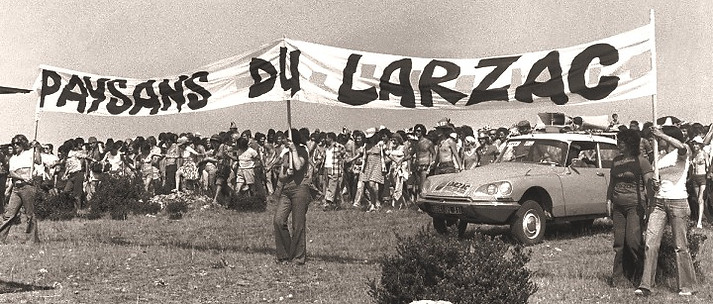A people
of resistance and resilience

The land called Larzac is known for one of the most significant civil disobedience movements in recent French history. Through purely non-violent means, local farmers banned together in protest of the extension of a military camp. They were joined by supporters from around the country who gathered on the high plateau to make their collective claims. The resistance lasted a decade (1971-81) until the French government, under newly elected president François Mitterand, finally conceded.
The inhabitants of the Larzac today are a curious blend of people deeply committed to their land and its traditions, but also keen on social and ecological experimentation. They are famous for raising sheep, but certainly not behaving like sheep given their opposition to centralized authority.
This cultural DNA is common to much of Occitania, harking back to earlier periods marked by the Cathars, the Albigenses, and the Templars, all of whom the State or the Church ultimately eradicated as heretics.
This is the right breed of people to locally instigate the most urgently-needed changes in the world, namely the restoration of our soil and water. Such changes are "heretical" in that they counter the doctrine of fossil-fueled intensive agriculture and economic growth.
I am honored and grateful to be welcomed and supported by the proud people of the Larzac.
What peace can we hope for the world with conflict raging on the homefront?

an intentional community
Let's join the people of the Larzac, and bring together others with a deep-seated aspiration to live harmoniously with nature. We can create greater levels of solidarity:
- to share resources and work together as stewards of common land,
- to grow healthy food on the land, and source most other food locally,
- to progressively meet our needs in energy, water, and waste disposal in the most environmentally responsible ways.

"Maybe you can't change the world, but you can change the world around you."
Join the CO-OP
The Co-Op (Société Cooperative d'Intérêt Collectif) provides the legal structure for sharing resources and developing complementary economic activities.
It is a profit-generating business, but with a non-profit mission to develop a flourishing ecosystem. To this end, profits are reinvested. Its governance is democratic, with each member equally represented.
The Co-Op will pursue the following objectives:
- Define and pursue projects with the greatest ecological impact.
- Pool resources in order to lower individual costs (energy, water, equipment, workshop, vehicles).
- Facilitate non-monetary transactions between members, using an accepted ledger of mutual services rendered; set special member discounts for monetary transactions.
- Promote the economic development of its members through common sales and marketing efforts.
- Involve local government in key decisions.
The Co-Op may include organic food producers and distributors, artisans, and any other potential stakeholders.
Sign-up to express your interest in the Co-Op and receive updates.

"Mass production alienates the human in favor of the machine, whereas
craftmanship fosters an ecology of human relations.
Let us pay the price to remain human."
The Forest Garden

A home is but the core of our habitat that extends to the surrounding ecosystem on which we depend. Most of us have lost touch with this notion of habitat. We just go to the store with no thought to our dependence. We have been hoodwinked by an economic system that has undermined our collective habitat with its toxic by-products and unintended consequences.
CANTOBRIA is an experiment in restoring habitat by means of a forest garden. Several acres of the property will be reserved for creating a diverse ecosystem in which edible, medicinal, or aromatic plants will grow, from the trees to the ground cover and everything in between.
This is the way to regenerate the soil, retain water, increase biodiversity, and improve the taste and nutritious content of food. In a nutshell, ours is a small-scale recipe for reversing the ecological disaster caused by intensive, industrial agriculture. We will need people with the knowledge, experience, or even just a desire to invest the time to learn and develop empirical knowledge.
Contact us if you would like to participate in the forest garden initiative, whether as a professional, a trainee, or a volunteer.

"Beyond luxury lies artful simplicity,
where having less allows us to be more."
Live in Cantobria
If you missed out on Arcadia, you can still make it to CANTOBRIA. The first was a myth, the second is a real opportunity to pursue a more sustainable way of life.
With vision and willingness to work together, we can create abundance from frugality. When land and certain resources are wisely shared, we can focus more on quality and preserve our local environment with a collective determination. This is how the transformation of our world begins.
The people of the Larzac and its valleys have much to teach us about solidarity and sensibility. Before such words as sustainability were invented, locals knew a thing or two about taking care of their land and their way of life.
Come visit, and if you really like what you experience, consider joining our effort. You can purchase or rent a property in the village of Cantobre, the nearby town of Nant, or the nearby larger town of Millau. Even if you were to live in metropolitan Montepellier, you could still easily spend a good bit of your time in CANTOBRIA.
How would you like to work together as sensible stewards of a rarely preserved land? We welcome you to join the effort.
Sign-up to our mailing list to stay abreast of progress.
